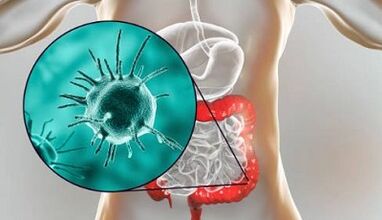
Parasitic diseases are a large group of diseases caused by helminths, some arthropods and protozoa.
Despite all the achievements of modern medicine and developed hygiene, according to statistics, about 90% of people around the world belong to these pathologies at least once in their lives.How to doubt a disease and which tests to get for parasites can be found in this article.
The types of parasites
Parasites are organisms that survive the living activity of living beings.Placement in the human body, during their growth and reproduction, lead to the absence of microelements, vitamins, proteins and other nutrients.They can both lead to relapses and irritations of chronic pathologies, and cause damage to the internal organs themselves.
There are the following types of parasites that can cause disease in humans:
- Protozoa (Amoeba, Lamblia);
- Pathogenic microorganisms (chlamydia, mycoplasma and others);
- Helminths (round worms, pinworms, bovine and pig carpets, etc.);
- Parasitic arthropods (scabies myth, demodex).
The main characteristic of the pathologies they cause is a long asymptomatic or low-impartial course.The parasites cleverly hide their existence, trying to "squeeze everything from the host's body" until his reserves are impoverished and the organ or tissue is seriously damaged.
Symptoms of parasitic diseases
Parasitic pathologies most often mean helminthias - diseases caused by the presence of worms in the body.In most cases, they occur in children, however, they can also develop in adults if hygiene rules are neglected.For a long time after infection, they do not manifest in any way, or are associated with delicate symptoms that often go unnoticed.

Each disease is characterized by certain features, but there are also common signs:
- Headaches, dizziness, increased weakness and fatigue.These manifestations are a consequence of intoxication that comes from poisoning with parasitic waste products.
- Irritation of bronchial asthma and allergic rhinitis, dermatitis, urticaria.They arise due to increased sensitivity to helminth cells and their secretion products.
- Digestion of the digestive system (abdominal pain, nausea, vomiting, heartburn, constipation and diarrhea).Helminths parasitizing in the intestinal lumen leads to inflammation and intestinal obstacle due to blockage of the intestinal lumen.
- Anemia, vitamin deficiency, weight loss.It occurs due to lack of protein, vitamins and microelements, decreased hormone production.
- Sleep urban disorder, chronic fatigue, irritability, irritability, muscle pain and joints.
To detect most types of helminths, it is necessary to do an excrement test or donate blood for the presence of specific antibodies.You can undergo the test at a clinic in your place of residence, after admission to a hospital, as well as in any of the private laboratories.Some medical centers provide a wide examination, during which you can diagnose the presence or absence of certain types of parasites in the body.
Tests for parasites

The attending doctor will tell you what tests you should take if you suspect a parasitic disease based on complaints, medical history and clinical manifestations of the disease.
The diagnosis begins with a general blood test.The most characteristic changes in helminthiasis will be:
- Reduce hemoglobin levels and a decrease in the number of red blood cells (occurs due to lack of protein and iron).
- An increase in the number of leukocytes, accelerating ESR (are signs of inflammation of the internal organs, in particular the gastrointestinal tract).
- An increase in eosinophils (a characteristic sign of an allergy that occurs in response to the irritating effects of helminth waste products).
For a more accurate diagnosis, stool tests for eggs and helminth pieces are used.When examining feces, you can detect pathogens of enterobiasis, ascariasis, hymenolipedosis, and also discover the presence of protozoan (Giardia) microorganisms.
It is important to remember that with a single test, the probability of detecting worm eggs in the feces is 30%.Therefore, to clarify the diagnosis, with the first negative result, the study is performed twice with an interval of 2-4 days.
To increase the accuracy of the study, it is important to carefully prepare to present excrement for analysis.The biological material should only be collected in a separate sterile container, which can be purchased at a pharmacy.A few days before the test, you should stop eating stained foods (beets, red berries, exotic fruits, sweets and colored drinks), and not use laxatives or rectum suppositories.
Immunoform analysis
Using ELISA analysis in adults and children, antibodies produced by the human body can be detected in response to the presence of foreign objects in it.To do this, the blood is obtained from a vein in which, in a laboratory, you can detect specific IgG antibodies in Giardia, Trichomonads, Pig and Bull Tapeworm, Trichinellah, Echinoccus, Toxocaris and Pinworms.With the help of this study, the presence of almost all parasites in the human body can be detected.
Preparation for the study is not complicated.It is necessary to take the morning test, with an empty stomach after hunger 8-10 hours.On the eve of the study, it is advisable not to take antibacterial and antihistamines, and also not to eat allergens (honey, seafood, exotic fruits and red berries, nuts).Immediately before donating blood, experts recommend resting in the laboratory room for 10-15 minutes.
The results of the study become known after 1-2 days.These studies are performed as initial diagnoses and treatment on treatment.
Timely detection and modern effective treatment of parasitic diseases avoids dangerous health complications.



























